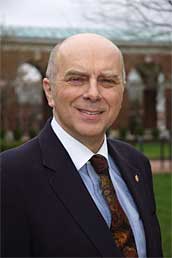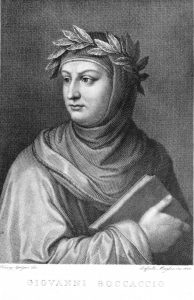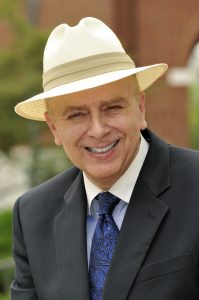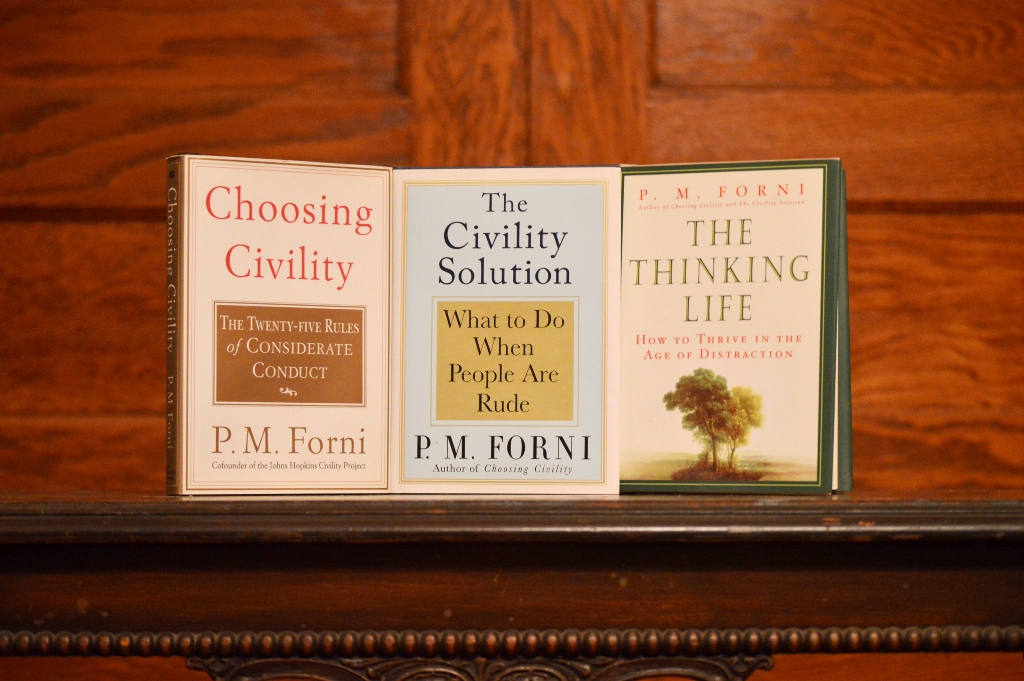P.M. Forni: Author, educator known for Johns Hopkins Civility Project, passes away at 67
Baltimore: P.M. Forni – Johns Hopkins University’s courtly professor of Italian Literature and co-founder of the institution’s highly acclaimed Civility Project – passed away in the early evening hours of December 1 after a long battle with Parkinson’s disease.
The well-regarded Towson resident was 67 years old.
An award-winning scholar, both in his native Italy and here in the U.S., Forni also founded and directed the Johns Hopkins University Civility Initiative in 2000. Two years later, his book, Choosing Civility: The Twenty-five Rules of Considerate Conduct, quickly sold more than 100,000 copies – bringing both the author and his subject to the national forefront. Forni would go on to write a second book on the subject of civility titled, The Civility Solution: What to Do When People Are Rude – while continuing to teach courses on the theory and history of manners.
His final volume, The Thinking Life: How To Thrive In The Age Of Distraction was published in 2011.
“He loved soccer; he loved his students and loved getting them started on their careers,” said Forni’s faithful wife of 18 years Virginia (Drake) Forni. “They all adored him. He was a wonderful colleague. He never played university politics or got into the academic ego game.
“He packed an awful lot into his life on both sides of the Atlantic, and that is no easy feat. His passing was peaceful, but he was due. He had suffered enough.”

Pier Massimo Forni. was born in the Veneto region of Italy in 1951. Forni received his undergraduate degree in Letters and Philosophy from the University of Pavia and his Ph.D. in Italian literature from UCLA. After stints at UC Davis and other American universities, Dr. Forni became a faculty member at Johns Hopkins University in 1985. A tenured professor in the Department of German and Romance Languages and Literatures, Forni continued to teach at John Hopkins until declining health forced a premature retirement in 2014.
Forni co-founded the Johns Hopkins Civility Project in 1997 with fellow Hopkins Professor Giulia Sissa. The aim of the project was to “assess the significance of civility, manners, and politeness in contemporary society.”
John C. McLucas – Professor of Italian Language and Literature in the Department of Foreign Languages at Towson University – fondly recalled Forni as a colleague and close personal friend.
“I met him went he first came to Hopkins in 1985. I attended the lecture he gave when he was a candidate for the position there, and of course, he was brilliant. We’ve been friends ever since.
“Since the news of his passing, I’ve been participating in an email thread of a virtual Who’s Who of Italian scholars and intellects from all over the world. Everyone who has written a personal remembrance mentions not only his intellect but his kindness. His sweetness as a mentor, a colleague, and a guide. It’s been a really interesting and touching string to be a part of.”
We asked McLucas what set P.M. Forni apart?

“P.M. was impressive to me because, in my world of academics, he was a noted scholar on Boccaccio and Medieval Italian Literature, as well as a rigorous intellect who strived to impart the resonance of classical literature for modern life. P.M. was committed to the idea that these books would inform our living for today. So he pursued that project about civility, which was a major interest of the Italian Renaissance. How do well-intentioned people interact in society? He took those lessons literally and applied them to situations in our life today.
“Civility was a major contribution of Late Medieval-Renaissance Italy to European discourse. Codes of behavior – codes of refined interaction. This permeated Italian literature and had a huge impact on the West. PM was occupied with finding ways to live that particular interest. I believe that informed most everything that he did.”
McLucas mentioned the many workshops and symposiums he attended as a colleague of Forni, noting that Forni had even hosted events featuring other well-known civility experts, such as author and etiquette authority Judith Martin (Miss Manners.)
“I’m sure you know that not every academic has the kind of access P.M. had to the public forum. He was unique in bringing the fruits of his research to the Oprah show and the New York Times. That has been a real gift from the academy to society.
“You know, in Italy, they don’t believe in being a nerd. They believe you should be a person of vast general culture – a Renaissance Man.
“That was P.M.
“I’m going to miss him.”
The Urbane Cowboy
Guests in the Forni home (as this reporter was on too many occasions to count) came to know P.M. as a man who was completely at ease in his surroundings. A knock on his door at noon might find the professor still in his pajamas – preparing for a phone interview with a nationwide radio audience. Lunches out were geared toward really getting to know his guests, and he always (gently) insisted on picking up the tab.
Forni also enjoyed antiquing and was especially proud of a grandfather clock he had purchased in Europe. A number of beautifully executed oil paintings also found their way across the pond. Forni took great care in the placement of such objects around his home and delighted in sharing these elegant works of art with his guests.

Most endearing was Thanksgiving in the Forni home. That was the day P.M. would set aside his dapper Brooks Brothers apparel to done the sort of Western wear which comes to mind when one hears a Gene Autry song.
“Today,” he would smilingly explain to bemused guests, “I am the Urbane Cowboy.”
“P.M. was just a very lovely, gentle, civil guy,” said Dr. Daniel L. Buccino – Clinical Manager of Johns Hopkins Hospital Broadway Center for Addiction. “He did have a sort of impish sense of humor with a twinkle in his eye. He loved animals, too, and I actually learned a trick from him about always carrying dog biscuits. I used to be afraid of dogs, but through knowing Pier Massimo, I’ve come to like dogs.
“I knew him through the Civility Initiative. I met him when the initiative started back in 1997. I was dealing with issues of manners and etiquette in psychotherapy. I was working at Hopkins Bayview but got in touch with him across town at Homewood, and we remained colleagues ever since. He was a great mentor with my work and remained so after I nominally took over the Civility Initiative for him.
“Of course, it’s impossible to fill his shoes.
“So I knew him primarily through the Civility Initiative – where he was an international leader – but the funny thing is civility was always his side gig. People forget that he was a brilliant academic and scholar of Boccaccio. He was an award-winning poet. He trained generations of grad students in Italian Literature. He really was a towering intellect and scholar.
“But he was very, very modest about it all. Very discrete.
“He was much more interested in asking about other people. He never really wanted to talk about himself. I would liken being friends with Pier Massimo to talking with Cal Ripken about the weather. You’re aware that this guy is a super-star, but you know him as just a regular person, and Pier Massimo was so kind and down to earth.”
We asked Buccino to comment of the lasting effects of Forni’s efforts to make the world a more civil place.

“I think his work will go on forever. Choosing Civility is a book which has literally sold over a million copies now. I think it’s one of those books that is going to stay in print forever and lead new generations of readers to a renewed commitment to civility. I think that book is a reflection of his ability to be really smart but also very accessible. Which is why readers of all ages, from middle school to retirement communities, take something of value from that book. It’s been translated into several languages, so there is something in it for everybody in a most practical way.
“He touched so many lives as an academic, as a poet, and a leading light in the civility revival. The fact that the civility work was a side line puts into perspective just how massive his main work was.”
Long before launching the Civility Project at Johns Hopkins University, Forni had made his mark in the literary world. He was a published poet as well as renowned a scholar on Italian artist Giovanni Baccaccio. Forni’s writings on Italian literature include Forme complesse nel Decameron (1992) and Adventures in Speech: Rhetoric and Narration in Boccaccio’s Decameron (1996).
A Lasting Legacy
Writing in 2008 for Smithsonian Magazine, journalist David Zax opined that P.M. Forni “will be remembered as one of the greatest generals in our nation’s struggle for civility.”
In his book, The Civility Solution, Forni noted that a key ingredient in a well-behaved world is the ability to empathize with those around us.
“Being aware of others is where civility begins,” he said. “To be fully aware of others, we must weave empathy into the fabric of our connection… The empathy of strangers is good for us, not just because it makes us feel better about ourselves and about life, but also because it encourages us to be better persons. Empathy is wonderfully contagious.”
In Choosing Civility, Forni concluded:
“Just about the most important thing we do in life is interacting with other human beings. Shouldn’t improving the quality of this interaction be at the top of our agendas? Being civil in our everyday lives is a time-tested way to bring about such improvement. A better quality of human interaction makes for a better life – a saner, more meaningful, healthier, and happier life. It is that simple. It really is that simple. All we have to do is stop, think about it, and then act. The sooner, the better.”
* * * * *
A memorial service for P.M. Forni will take place on January 5, 2019 at 11 AM at St. Mark’s Evangelical Lutheran Church in Baltimore. The church is located at 1900 St Paul St, Baltimore, MD 21218.

Anthony C. Hayes is an actor, author, raconteur, rapscallion and bon vivant. A one-time newsboy for the Evening Sun and professional presence at the Washington Herald, Tony’s poetry, photography, humor, and prose have also been featured in Smile, Hon, You’re in Baltimore!, Destination Maryland, Magic Octopus Magazine, Los Angeles Post-Examiner, Voice of Baltimore, SmartCEO, Alvarez Fiction, and Tales of Blood and Roses. If you notice that his work has been purloined, please let him know. As the Good Book says, “Thou shalt not steal.”

